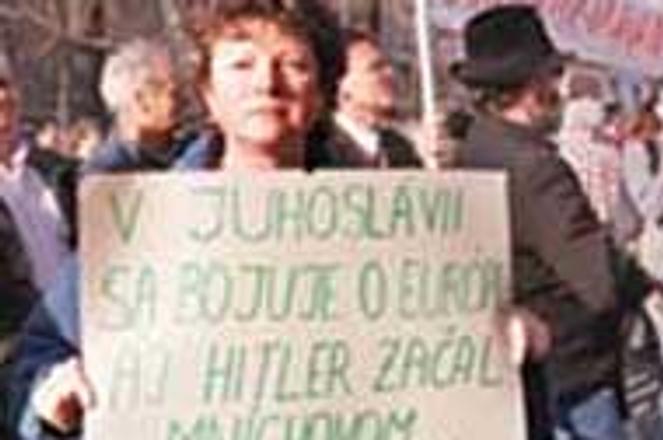This March 26 Bratislava demonstration against NATO air strikes in Yugoslavia was the first of many in Slovakia during the first week of the alliance's air campaign. The sign in the picture compares the strikes with Adolf Hitler's 1938 takeover of Czechoslovakia.photo: TASR
The Slovak government's decision to allow NATO warplanes to fly through the country's airspace on their way to bombing assignments in Yugoslavia has split the nation. While government politicians expressed support for the NATO campaign, opposition deputies branded Slovakia's collaboration with the alliance as "illegal." Ordinary Slovaks, meanwhile, appeared profoundly uneasy about abetting a military operation against a regional neighbour.
"I can't understand how they can do it," said a 20 year-old journalist from Bratislava who asked not to be named. "It's intervention, and they're killing innocent people."
On March 25, the day that NATO bombing raids began, the cabinet of Prime Minister Mikuláš Dzurinda officially announced that Slovak air space would be made available for the needs of the NATO Air Force in the war over Kosovo.
Foreign Minister Eduard Kukan told the press on the same day that Slovakia was obliged to allow its air space to be used for NATO overflights, in accordance with the responsibilities that went with the nation's membership in Partnership For Peace, a grouping of countries cooperating with NATO in military activities.
On the other hand, Kukan stressed that Slovakia would not participate in bombing operations directly, since it was not a member country. "Since we're not a NATO member, we don't want to complicate the situation [with Slovakia's participation]," he said.
The decision to allow NATO overflights was quietly appreciated by top alliance officials. A source at NATO headquarters in Brussels, speaking on condition of anonymity, told The Slovak Spectator on March 29 that "Slovakia's decision was received extremely positively by top NATO officials," but added that the alliance could not publicly express its gratitude "at such a sensitive time."
Pictures like this of bombing in Yugoslavia have made many Slovaks question the wisdom of helping NATO.photo: TASR
But Radislav Džuver, Consul at the Yugoslav Embassy in Bratislava, was outraged by the Slovak government's decisions. "We cannot believe that a friend country [Slovakia] is in a way helping NATO to bomb our country," he said in an interview with The Slovak Spectator.
Džuver said that Yugoslavia was eager to maintain a friendly relationship with Slovakia, but said he was worried that the Kosovo conflict could affect bilateral relations. "So far, relations haven't been harmed either in practice or at an official level, but we're in a very difficult position, and I don't want to predict the future," he said.
Confusion and anger
The domestic critics of Slovakia's involvement in the Kosovo crisis have unanimously declared that the government should have turned down the alliance's appeal for help.
The far-right Slovak National Party (SNS), long a staunch opponent of NATO, delivered an official statement to the US Embassy in Bratislava on March 25, in which the party's leaders expressed deep concern about the legitimacy of the air strikes in Kosovo.
"The SNS warns that a precedent may be set with the NATO-backed support of illegal minority demands [of Kosovo Albanians]," the statement read.
"We, the nationalists, feel ashamed of our government, which does not have the authority to make these immature decisions," the statement continued.
Other grass-roots nationalist groups, such as the cultural association Matica Slovenská, organized numerous small anti-NATO demonstrations around the country during the first week of bombing in Yugoslavia. On March 26, a group of around 100 people gathered outside the US Embassy in Bratislava to protest American interference in Yugoslavia's internal affairs.
"NATO murders while the [Slovak] government is silent," read one of the banners the crowd waved at embassy officials. "Yugoslavia is a fight for Europe; even Hitler started with Munich," read another one, recalling the infamous 1938 Munich agreement under which Adolf Hitler was ceded title to Czechoslovakia.
Deputies from the governing coalition, meanwhile, were unanimous in supporting the measures the alliance had taken. All coalition parties officially supported NATO actions to prevent what the alliance described as "genocide" against ethnic Albanians inhabiting the province of Kosovo, and said Slovakia had offered what help it could to bring the crisis to a resolution.
"I'm glad that Slovakia offered this help to NATO, which I hope will bring the bloodshed in Kosovo to an end," said Vladimír Palko, chairman of the Parliamentary Defence and Security Committee.
"I'm surprised, however, that there still exist people who protest against the bombing, but were silent when [ethnic Albanian] women and children were being slaughtered," Palko continued.
Slovaks seize NATO support
The split among Slovak politicians and citizens may have implications beyond the current furore over Yugoslavia. One political analyst said that the Kosovo crisis had indirectly influenced attitudes towards NATO in central European countries, and could predispose Slovaks against joining the alliance in the future.
Opinion polls conducted by the US Information Agency (USIA) in October 1997 showed that a mere 54% of Slovaks favoured NATO membership, slightly less than in the neighbouring Czech Republic (59% in 1997), which became a NATO member on March 12 this year.
But Ivo Samson, an analyst with the Slovak Foreign Policy Association, an independent think tank, warned that the 1997 Slovak poll might have exaggerated how many Slovaks really supported NATO. The fact that a May 1997 referendum on NATO was marred by the cabinet of former Prime Minister Vladimír Mečiar, he said, could have led people to associate NATO with strong feelings they had about not being allowed to express their will.
"Today the situation is different," Samson said. "The greater part of society has strong anti-western feelings, and these people could be joined by those who are simply against bombing."
The consequence of this trend, Samson said, might be that the majority of the Slovak population would turn against the Dzurinda government in its efforts to enter NATO.


